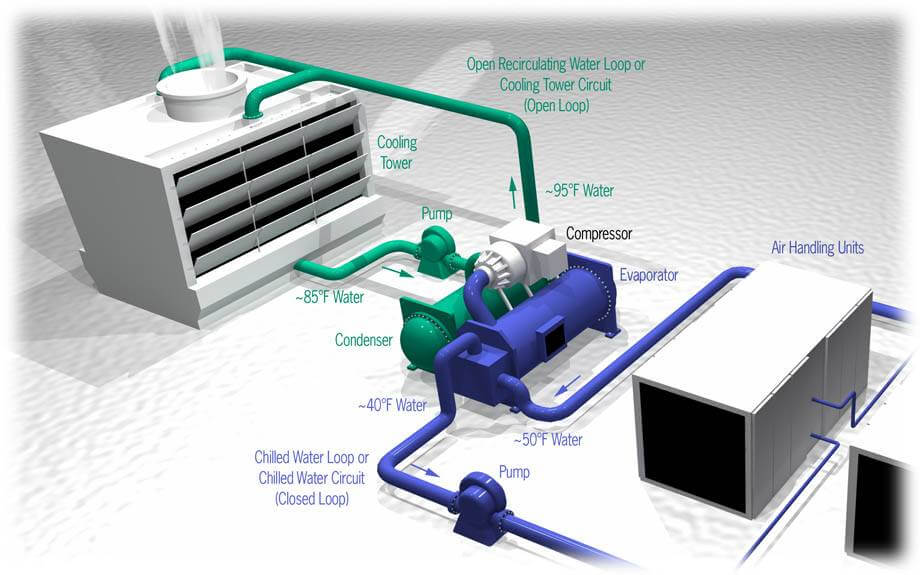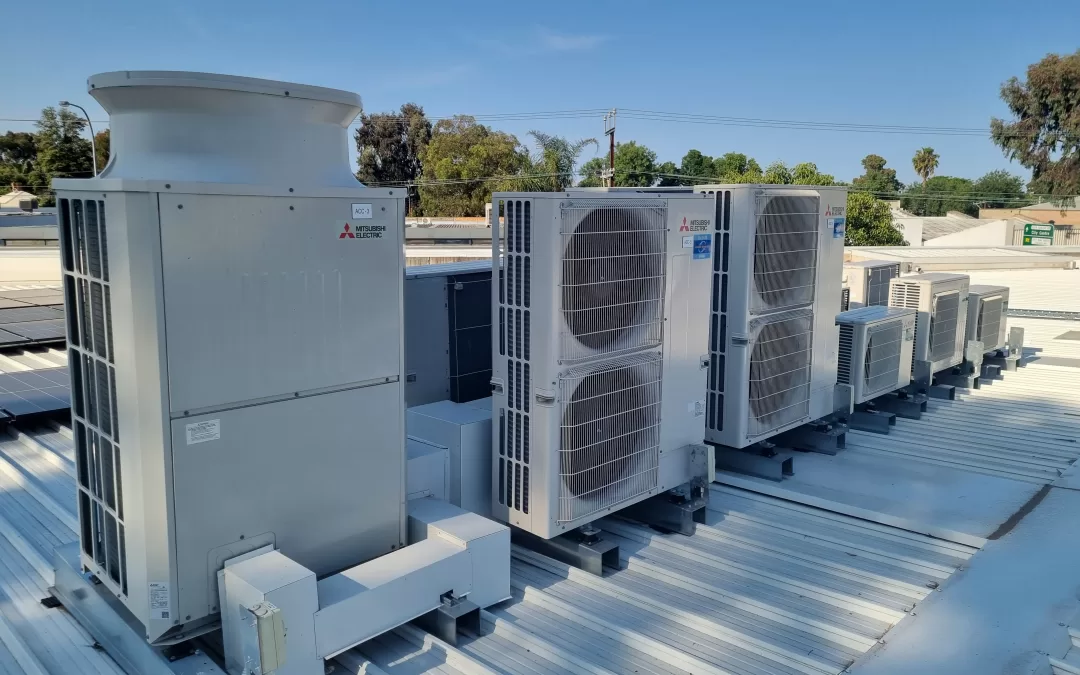Just How a Trusted HVAC System Enhances Indoor Air High Quality and Convenience
A reputable cooling and heating system is essential for keeping interior air quality and convenience. It controls temperature and moisture, developing a much healthier living setting. Efficient air filtering eliminates pollutants and irritants, while proper humidity degrees stop mold development. Normal maintenance guarantees peak performance, boosting system performance. Understanding these elements exposes just how they communicate to develop a fresh atmosphere. The relationship between A/c systems and general wellness goes much deeper than one could anticipate.
Understanding the Basics of Cooling And Heating Systems
A/c systems, fundamental for modern convenience, incorporate heating, air flow, and air conditioning components that work together to control indoor settings. These systems are created to preserve optimal temperature levels, ensuring that rooms continue to be comfortable regardless of outside weather. Burner, such as heaters or heatpump, supply warmth throughout colder months, while cooling units cool down spaces when temperature levels climb.
Air flow plays an important duty, facilitating the flow of fresh air and removing stagnant air, which helps in maintaining a balanced environment. Numerous sorts of a/c systems exist, consisting of streamlined and decentralized setups, each suited for various structure dimensions and objectives. Additionally, modern-day developments have introduced clever technologies, enabling improved control over interior environment. Understanding these fundamentals makes it possible for customers to appreciate exactly how heating and cooling systems add to overall health and convenience in commercial and domestic areas alike, laying the groundwork for discussions on their effect on indoor air quality.
The Duty of Air Purification in Indoor Air Top Quality
A remarkable facet of maintaining interior air top quality works air filtering, which plays a vital role in eliminating toxins and allergens from the setting. HVAC systems geared up with top quality filters can record a variety of pollutants, including dirt, pollen, pet dog dander, and mold spores. This filtering process significantly reduces the focus of air-borne particles, leading to a cleaner and healthier indoor ambience.
Routine maintenance of air filters is crucial to ensure peak efficiency. Blocked or unclean filters can prevent air flow, reducing the system's performance and potentially allowing contaminants to distribute within the room. By replacing or cleaning up filters as recommended, property owners can boost their heating and cooling system's capacity to provide fresh air.
Moisture Control and Its Influence On Convenience
While many may concentrate on temperature regulation, moisture control is equally vital for keeping convenience in interior settings. High humidity degrees can lead to discomfort, making spaces feel warmer than they actually are, while low moisture can trigger dry skin, irritability, and boosted sensitivity to breathing concerns. A reputable HVAC system plays a significant function in taking care of interior moisture, making sure that air is neither also completely dry nor as well moist.
Optimal humidity degrees typically range from 30% to 50%, promoting a comfortable environment. When humidity is well-regulated, residents experience improved thermal comfort, improved interior air high quality, and reduced dangers of mold and mildew growth and dirt mite expansion. In addition, appropriate moisture control can safeguard furnishings and structural components from damage brought on by excessive dampness or dry skin. Subsequently, incorporating efficient humidity administration right into cooling and heating systems is crucial for fostering a healthy and balanced and positive indoor setting for well-being and efficiency.
The Value of Routine Upkeep
Regular maintenance of HVAC systems is crucial for making certain peak performance and long life. This proactive strategy not just reduces prospective failures yet additionally improves power efficiency, which can result in significant expense savings gradually. Scheduled evaluations permit technicians to determine and deal with problems before they rise into costly repair services, guaranteeing the system runs efficiently.
In addition, regular maintenance involves cleansing or replacing filters, examining cooling agent degrees, and evaluating ducts, every one of which contribute to suitable air flow and system efficiency. By maintaining the cooling and heating system, homeowners can also prevent extreme deterioration on elements, prolonging the overall life-span of the system.
A properly maintained Heating and cooling system operates silently and safely, reducing the risk of harmful scenarios. Finally, regular maintenance is a crucial financial investment in both the performance of cooling and heating systems and the convenience of interior environments, eventually advertising a much healthier space.

How A/c Equipment Reduce Allergens and Pollutants
Effective a/c systems play a necessary role in lowering allergens and pollutants within interior settings, thus boosting general air high quality. These systems utilize advanced filtration innovations that capture dust, plant pollen, mold and mildew spores, and pet dog dander, preventing them from distributing throughout the living room. High-efficiency particulate air (HEPA) filters are especially effective, trapping approximately 99.97% of fragments as tiny as 0.3 microns.

Energy Performance and Its Benefits for Health
Energy-efficient HVAC systems not just reduce energy usage yet additionally have considerable health and wellness advantages for occupants. By optimizing energy use, these systems can maintain regular indoor temperatures, which aids avoid the development of mold and mold. Managing humidity levels is vital for respiratory system wellness, as excess moisture can worsen allergies and bronchial asthma. Furthermore, energy-efficient systems commonly integrate innovative filtration modern technologies that enhance air quality by removing air-borne bits and toxins, further improving total health.
Lower energy intake implies reduced emissions from power plants, adding to cleaner outside air top quality, which indirectly sustains the health of residents. With an emphasis on sustainability, energy-efficient cooling and heating systems advertise a much healthier living atmosphere. By buying such systems, homeowners not only save money on energy expenses but likewise make a considerable dedication to the health and wellness of their communities and households. Inevitably, power efficiency in a/c systems fosters a much healthier interior ambience for all.
Enhancing Comfort Through Smart Technology Integration
As smart technology continues to advance, its integration into a/c systems substantially improves indoor convenience. Smart thermostats, for example, permit individuals to customize heating and cooling down timetables based on their day-to-day routines, making certain ideal temperatures when individuals are home. These gadgets can discover preferences gradually, changing settings automatically for optimum convenience.
Moreover, clever sensors check interior air quality and humidity degrees, giving real-time responses that aids preserve a healthy and balanced setting. By interacting with cooling and heating units, these sensing units can motivate changes to airflow and temperature level, making certain consistent comfort.
Mobile applications further encourage users, allowing remote of HVAC settings from anywhere, thereby providing ease and flexibility.
Regularly Asked Concerns

How Can I Tell if My A/c System Is Reliable?
To figure out heating and cooling effectiveness, one can inspect power costs for abnormalities, evaluate for unusual sounds, monitor temperature level consistency, assurance appropriate air flow, and routine normal upkeep. These aspects collectively show the system's functional performance and effectiveness.
What Signs Suggest Poor Indoor Air Quality?
Indications of inadequate indoor air top quality consist of consistent odors, excessive dirt accumulation, boosted allergy symptoms, noticeable mold development, and changing moisture levels. These indicators typically recommend that ventilation or air purification systems might be insufficient or malfunctioning.
Can a Cooling And Heating System Assist With Pet Dog Dander?

How Often Should I Change My Air Filters?
Air filters should commonly be changed every 1 to 3 months, relying on use and interior air top quality. HVAC experts. Regular replacement helps maintain effective air movement and minimizes dirt, allergens, and various other fragments in the home setting
What Are the Costs of HVAC System Installment?
The prices of cooling and heating system installation usually range from $3,000 to $7,000, relying on elements such as system kind, home size, and neighborhood labor prices. Added functions may enhance total expenses significantly.
A reputable Cooling and heating system is vital for keeping indoor air high quality and comfort. A/c systems, essential for modern-day convenience, include air, heating, and air flow conditioning components that work with each other to control indoor settings. Effective Heating and cooling systems play an important function in lowering irritants and contaminants within indoor settings, thus improving overall air high quality. A Heating and cooling system can significantly decrease animal dander by utilizing sophisticated filtering systems and normal upkeep (HVAC experts). The costs of Heating and cooling system setup usually vary from $3,000 to $7,000, depending on aspects such as system kind, home size, and local labor prices